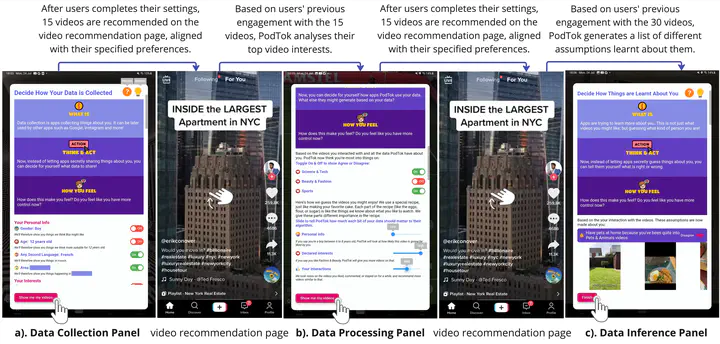Two papers accetped at CHI'2024

We are thrilled to announce that the Oxford CCAI Team had two papers accepted at CHI'2024.
Ge Wang, Jun Zhao, Max Van Kleek and Nigel Shadbolt. KOALA Hero Toolkit: A New Approach to Inform Families of Mobile Datafication Risks. CHI 2024. Overall acceptance rate 26.3%. To appear
This is the final evaluation study of the KOALA Hero research project, led by Dr Jun Zhao, the precedent of Oxford CCAI. In this work we present a new hybrid toolkit, KOALA Hero, designed to help children and parents jointly understand the datafication risks posed by their mobile apps. Through user studies involving 17 families, we assess how the toolkit influenced families’ thought processes, perceptions and decision-making regarding mobile datafication risks. Our findings show that KOALA supports families’ critical thinking and promotes family engagement, providing timely inputs on global efforts aimed at addressing datafication risks and underscoring the importance of strengthening legislative and policy enforcement of ethical data governance.
This work has also contributed to Dr Zhao’s discussion paper to be publised by the British Academy, jointly authored with Dr Ekaterina Hertog from Oxford Internet Institute and Ethics in AI Institute and Professor Netta Weinstein from University of Reading.
Ge Wang, Jun Zhao, Max Van Kleek and Nigel Shadbolt. CHAITok: A Proof-of-Concept System Supporting Children’s Sense of Data Autonomy. CHI 2024. Overall acceptance rate 26.3%. To appear
CHAITok explores children’s ‘sense of data autonomy’. In this paper, we present CHAITok, a Solid-Based Android mobile application designed to enhance children’s sense of autonomy over their data on social media. Through 27 user study sessions with 109 children aged 10–13, we offer insights into the current lack of data autonomy among children regarding their online information and how we can foster children’s sense of data autonomy through a socio-technical journey. Our findings provide crucial insights into children’s values, how we can better support children’s evolving autonomy, and design for children’s digital rights. We emphasize data autonomy as a fundamental right for children, call for further research, design innovation, and policy changes on this critical issue.
The papers will be presented in May 2024. But please feel free to get in touch with the lead authors should you have any questions.